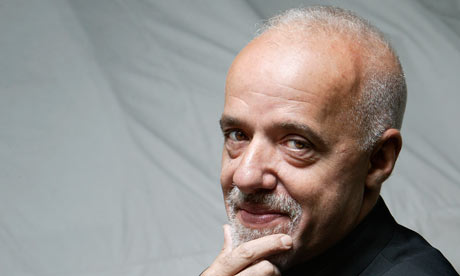
'I feel the presence of angels around me' ... Paulo Coelho. Photograph: Murdo Macleod
The Winner Stands Alone is your 12th novel. You describe it as "a stark portrait of where we are now". What you do mean by that?
I wrote it in February last year, before this [financial] collapse. We have lost contact with reality, the simplicity of life. This book is about how we complicate our lives and how our dreams are manipulated.
Your most successful book, The Alchemist, has sold 30m copies.
More than that. I think it's 35m. All together my books have sold 150m copies. You can add another 20% for pirated editions.
Is it true you wrote it in four weeks?
Two weeks. Yes. The book was already written in my soul.
When it first came out it was dropped by the publisher. Then what happened?
It was not dropped by the publisher. It was published, it did not sell, and then the publisher said, "This book is never going to sell" - which was worse than to be dropped. At least then you think, "Oh, I'll find another publisher." This way, when you go to another publisher they say, "Well, it was published and nobody's interested." However, I was so convinced it was a great book that I started knocking on doors. [Now] The Alchemist is the most translated book by a living author.
Do you really believe in angels?
Yes.
Have you seen one?
No, I never saw an angel, but it is irrelevant whether I saw one or not. I feel their presence around me. Not the classic angel with the wings etc, but you know that you are protected. This has nothing to do with esoteric things, it is your attitude towards life. When you are enthusiastic about what you do, you feel this positive energy. It's very simple. Everything is possible, from angels to demons to economists and politicians.
Some say your books have changed their lives; others are quite snobby about your work. Why is it so divisive?
This is not something I ever thought about. When I write a book I write a book for myself; the reaction is up to the reader. It's not my business whether people like or dislike it.
Do the critics hurt you?
No. Writers are lampposts and critics are dogs. Ask lampposts what they think about dogs. Does the dog hurt the lamppost?
How do you describe your books? Are they self-help?
No, I am not a self-help writer. I am a self-problem writer. When people read my books I provoke some things. I cannot justify my work. I do my work; it is up to them to classify it, to judge.
Some people see you as a guru. Do you accept that?
Of course not.
Is it flattering?
No. It's totally out of reality.
Are you a political writer?
Everybody is a political person, whether you say something or you are silent. A political attitude is not whether you go to parliament, it's how you deal with your life, with your surroundings. I am at least giving the readers the sense they are not alone. But instead of trying to answer the question, "What is the meaning of life?" I try to give some meaning to my life.
When you were 17 your parents had you committed to an asylum.
Yes, three times, and also I was in jail three times, but I never saw myself as a victim. This is part of my journey. My parents wanted me to follow their dreams, not my dreams, and the simple fact that I didn't accept that does not make me a criminal or an outcast. I thought, "One day I will write about it," and I did. I wrote Veronica Decides to Die, and the book was about this: accept your differences and this is how you make a difference.
Those experiences could make someone very angry and very politicised.
The jail experience did not make me angry. It made me scared. But that is worse - when you are angry, you react; when you are scared, you don't react, you just accept. It took me many years to overcome this fear, but time heals everything, love included ·
• Paulo Coelho's latest novel, The Winner Stands Alone, is out now (HarperCollins, £14.99).
No comments:
Post a Comment